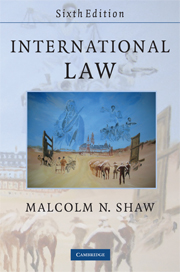Book contents
- Frontmatter
- Contents
- Preface
- Table of cases
- Table of treaties and selected other international instruments
- List of abbreviations
- 1 The nature and development of international law
- 2 International law today
- 3 Sources
- 4 International law and municipal law
- 5 The subjects of international law
- 6 The international protection of human rights
- 7 The regional protection of human rights
- 8 Individual criminal responsibility in international law
- 9 Recognition
- 10 Territory
- 11 The law of the sea
- 12 Jurisdiction
- 13 Immunities from jurisdiction
- 14 State responsibility
- 15 International environmental law
- 16 The law of treaties
- 17 State succession
- 18 The settlement of disputes by peaceful means
- 19 The International Court of Justice
- 20 International law and the use of force by states
- 21 International humanitarian law
- 22 The United Nations
- 23 International institutions
- Some useful international law websites
- Index
2 - International law today
Published online by Cambridge University Press: 05 June 2012
- Frontmatter
- Contents
- Preface
- Table of cases
- Table of treaties and selected other international instruments
- List of abbreviations
- 1 The nature and development of international law
- 2 International law today
- 3 Sources
- 4 International law and municipal law
- 5 The subjects of international law
- 6 The international protection of human rights
- 7 The regional protection of human rights
- 8 Individual criminal responsibility in international law
- 9 Recognition
- 10 Territory
- 11 The law of the sea
- 12 Jurisdiction
- 13 Immunities from jurisdiction
- 14 State responsibility
- 15 International environmental law
- 16 The law of treaties
- 17 State succession
- 18 The settlement of disputes by peaceful means
- 19 The International Court of Justice
- 20 International law and the use of force by states
- 21 International humanitarian law
- 22 The United Nations
- 23 International institutions
- Some useful international law websites
- Index
Summary
The expanding legal scope of international concern
International law since the middle of the last century has been developing in many directions, as the complexities of life in the modern era have multiplied. For, as already emphasised, law reflects the conditions and cultural traditions of the society within which it operates. The community evolves a certain specific set of values – social, economic and political – and this stamps its mark on the legal framework which orders life in that environment. Similarly, international law is a product of its environment. It has developed in accordance with the prevailing notions of international relations and to survive it must be in harmony with the realities of the age.
Nevertheless, there is a continuing tension between those rules already established and the constantly evolving forces that seek changes within the system. One of the major problems of international law is to determine when and how to incorporate new standards of behaviour and new realities of life into the already existing framework, so that, on the one hand, the law remains relevant and, on the other, the system itself is not too vigorously disrupted.
Changes that occur within the international community can be momentous and reverberate throughout the system. For example, the advent of nuclear arms created a status quo in Europe and a balance of terror throughout the world. It currently constitutes a factor of unease as certain states seek to acquire nuclear technology.
- Type
- Chapter
- Information
- International Law , pp. 43 - 68Publisher: Cambridge University PressPrint publication year: 2008
- 1
- Cited by



